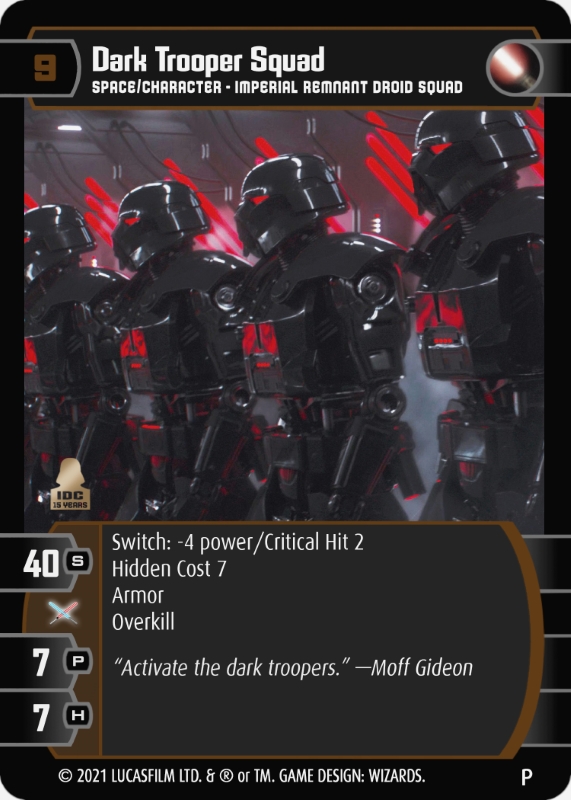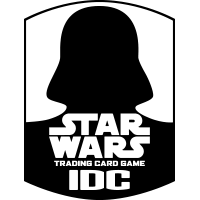
9
40
7
7
Side
Dark
Rarity
Promotional
Version
A
Type
Space/Character
Points
0
Subtype
Expansion
Abbreviation
Card Number
49 / 90
Author/Publisher
Independent Development Committee
Publish Date
6/2/2021

Card Text
Switch: -4 power/Critical Hit 2
Hidden Cost 7
Armor
Overkill
Keywords
- Armor
- Armor: An isolated, static ability that means, "This unit can only be hit on a roll of 5 or more." Armor works against dice of damage and attack dice. It redefines what die roll is required to hit a unit. It doesn’t modify the die roll like Accuracy. A unit with Accuracy 1 attacking a unit with Armor hits with 4's, 5's, and 6's.
- Critical Hit
- Critical Hit X: A cumulative ability triggered during the pending damage POP that means, "If you rolled at least one natural six with this unit's attack dice, this unit does X more damage for this attack." Only one natural "6" counts in the attack roll after re-rolls. If a unit gets the Critical Hit ability after you roll attack dice, it's too late to affect the damage. Accuracy can't increase the die roll to a natural "6". However, you or your opponent may use an effect to re-roll dice to affect the number of natural sixes. (You only count the six, if any, from the roll used for the attack.) Critical Hit applies only to dice rolled for an attack, not to dice rolls for abilities like Retaliate.
- Hidden Cost
- Hidden Cost X: A selective, static effect that means, "As long as you have a number of build counters on this card equal to X or the unit's current build cost (whichever is less), you may complete it anytime by paying Force for the remaining build cost, if any." Effects and stacking rules may reduce the build cost. You do not need to pay Force if the build cost is within the Hidden Cost integer. You can deploy it to the build zone. Hidden cost can only be played if the card is partially built and has the required number of build counters on it. You may use Hidden cost anytime, even during any Play-or-Pass chances not reserved for re-roll, damage prevention, or disrupt POP chances. If there are a number of build counters on the unit equal to or greater than the Hidden Cost integer, you do not need to pay any Force. You may not use Hidden Cost to deploy a Pilot to a unit.
- Overkill
- Overkill: An isolated ability triggered during the pending damage POP that means, "When this unit attacks, you may divide hits in excess of the defending unit's remaining health between that unit and another unit in the same arena." The player who controls the attacking unit decides how many hits (if any) in excess of the defending unit's remaining health to reassign as damage to the second unit. (That player can't change their mind afterward.) A number of hits equal to the defending unit's health must be assigned to the defending unit, and the remainder may be assigned to the defending unit or another unit in the same arena. Overkill damage is caused by the ability, not the die roll. Shields, Parry, and Armor have no effect against it, but damage prevention not specifying dice works normally. Both units resolve damage in tandem.
- Switch
- Switch: [1st/2nd/3rd type effect]: A layered, static ability that means, "As long as this unit is in the first arena listed on its type line, it gets the effects listed to the left of the first slash. As long as this unit is in the second arena listed on its type line, it gets the effects listed to the right of the first slash. As long as this unit is in the third arena listed on its type line, if any, it gets the effects listed to the right of the second slash, if any." If it says "None" as one of the arena type's effect, it means that it gets no extra effects while in that arena. The unit's Switch effects will correspond to the types listed on the unit's type line. There won't be a slash for an arena not listed in the unit's type. Switch doesn't allow units to change arenas during the battle phase.
You must be logged in to favorite a card. Click here to login or register.